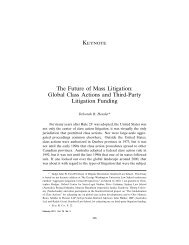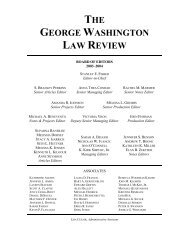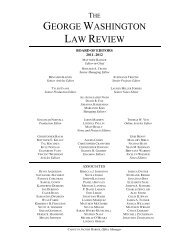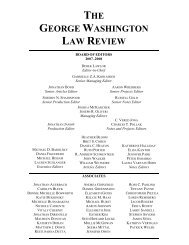View PDF - The George Washington Law Review
View PDF - The George Washington Law Review
View PDF - The George Washington Law Review
You also want an ePaper? Increase the reach of your titles
YUMPU automatically turns print PDFs into web optimized ePapers that Google loves.
858 <strong>The</strong> <strong>George</strong> <strong>Washington</strong> <strong>Law</strong> <strong>Review</strong> [Vol. 78:846<br />
of an interview more or less valuable. An interviewee who knows<br />
what topics will be explored will have more time to reflect on them,<br />
and in doing so may elicit memories and detail that would otherwise<br />
have remained buried. In similar fashion, an interviewee who reviews<br />
a transcript can pick out things that come across as incomplete or inaccurate,<br />
and can even provide supplemental detail. But there is<br />
value to spontaneity as well. Just as we are willing to admit hearsay<br />
evidence when the circumstances suggest that the declarant spoke<br />
spontaneously and without time to reflect (and thus without having<br />
the time to lie), we might imagine that an interviewee confronted with<br />
an unanticipated question might give a less practiced, and thus more<br />
accurate, response. Without an understanding of the parameters of<br />
the interview, however, it is difficult to know which is the better<br />
conclusion.<br />
Substantively, my sense is that the Fairchild histories are of limited<br />
value in terms of providing insights into the judicial process.<br />
Some of this may be a product of his career. Judge Fairchild had a<br />
relatively lengthy political career—among other things, he ran for and<br />
served as Attorney General of Wisconsin, and ran for the United<br />
States Senate twice—and it is accordingly unsurprising that significant<br />
portions of all three histories are devoted to the parts of his career<br />
that preceded his time on the bench. Still, Judge Fairchild makes four<br />
appearances in Federal Judges Revealed, which seems to make him<br />
roughly average among the judges considered in terms of the number<br />
of times that Domnarski refers to him. <strong>The</strong> first concerns his educational<br />
background. 59 <strong>The</strong> second relates to the circumstances of his<br />
appointment. 60 <strong>The</strong> third deals with an administrative issue that arose<br />
when Judge Fairchild was Chief Judge of the Seventh Circuit and that<br />
involved a pair of senior judges whose capacities had declined somewhat.<br />
61 <strong>The</strong> fourth is a discussion of the processes of opinionwriting.<br />
62<br />
Only the first two of these topics appear in all three histories, and<br />
only the second relates directly to the study of judicial institutions.<br />
Because Judge Fairchild discusses his appointment to the Seventh Circuit<br />
in each of these histories, more detailed consideration of those<br />
59 Judge Fairchild was unique among the judges Domnarski considered in that he attended<br />
Deep Springs College, which Domnarski characterizes as “an experimental college.” DOMNAR-<br />
SKI, supra note 20, at 21–22; see also 1992 Interview, supra note 49.<br />
60 DOMNARSKI, supra note 20, at 99–100.<br />
61 Id. at 173.<br />
62 Id. at 183–84.









